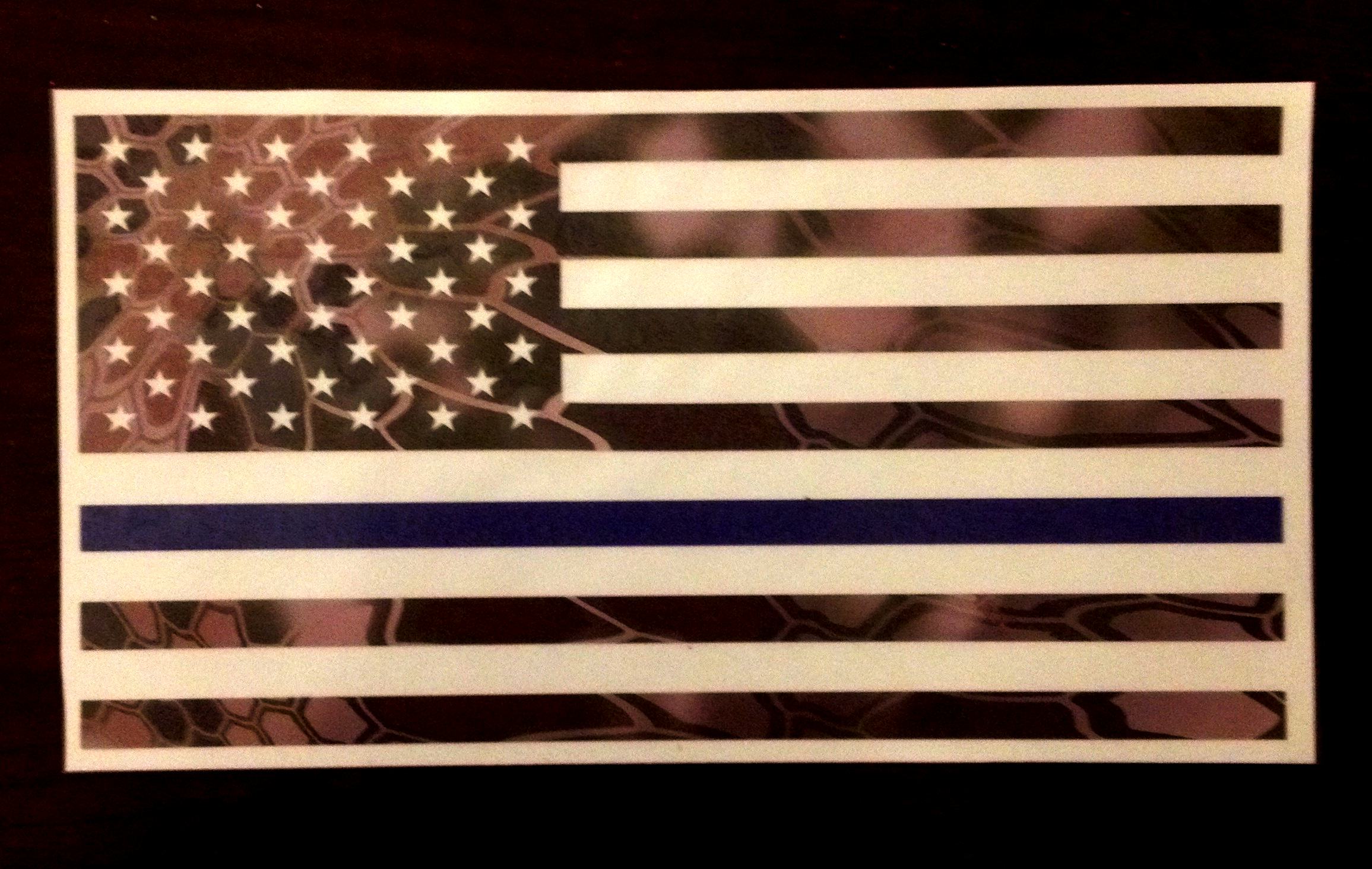
Citizens have the right to desecrate the American flag but the real question is, do government agencies have the right to desecrate the American flag? I don't like it when anyone desecrates old glory but I respect their right to do it. There was a time when American police proudly displayed old glory in the shoulders of their uniforms. That has changed.

 |
| Blue ISIS member displaying the flag of tyrants. |
This flag is unAmerican, tyrannical and treasonous. It does not belong in America. It should not be displayed by any governmental agency.
The Supreme Court has found laws banning desecration of the American flag to be unconstitutional. The court ruled that it falls under the First Amendment protection of free speech in the Constitution. Despite this, the majority of states continue to have desecration laws on the books.
What State Laws on Flag Desecration Include
State laws vary though in some form they deal with the misuse, abuse, and desecration of flags. It extends beyond the American flag to include state flags and, in some states, the as well as the treasonous Confederate flag.
Though they vary, the laws prohibit defiling, defacing, casting contempt upon, and sometimes even satirizing these flags. Most laws specify actions, but some criminalize words as well. A few include other venerated objects in their protections.
You will even find many state laws that prohibit the use of the image of the American flag. In most cases, these refer to commercial products such as a law in Maryland that has since been removed. Others, like that in Alaska, have banned trademark registrations that disparage national symbols.
Are State Laws Enforceable?
The 1989 Supreme Court case, Texas v. Johnson put flag desecration to the test. It was through this dispute over flag burning that laws banning desecration of the flag were found to be unconstitutional. This was backed up a year later in United States v. Eichman. Since that time, the state laws have, essentially, been void.
However, numerous people have been arrested in the years since for violating one of the states' laws. In most cases, the charges were dropped as prosecutors familiar with constitutional law realize that they are impossible to prosecute.
While you can be arrested for burning or otherwise desecrating the flag, it is unlikely that the charges will stand. And yet, it should also be noted that any other results from that action may result in other criminal charges.
Why Do the States Still Have These Laws?
If the state flag desecration laws are illegal, then why are they not removed? It is a good question which many asked once again when then-President-elect Donald Trump mentioned punishing flag burners on Twitter in November 2016.
The ABC News article regarding this issue brings up a logical point. In it, writers James King and Geneva Sands point out that removing desecration laws is not popular, despite their conflict with the Constitution. Many state lawmakers find it difficult to even approach the issue in their respective legislatures and with their constituents. Many choose to simply ignore the matter.
A Finer Look at State Flag Desecration Laws
Again, states vary greatly in their flag desecration laws. It's also likely that some of these points may become obsolete in the near future. However, it's important to understand what may be part of these laws and the reasoning behind them.
Publicity. It's rarely a crime to deface, burn, or desecrate an American flag if you do so in the privacy of your home. It's only a crime to do it in public or take a flag so altered and display it in public. If the crime is the action, though, why does it have to be public? This suggests that the law exists to protect people's sensibilities rather than flags.
Outraged Sensibilities. Many laws specify that a crime only occurs if the action outrages the sensibilities of those who see or even merely learn of it. Desecrating a flag is not a crime in and of itself; it only becomes a crime when people get upset. Once again, the purpose appears to be protecting people's feelings.
Intent. Most state laws specify that flag desecration is only a crime if the person intentionally or knowingly does it. If the point is to protect flags, however, why aren't there provisions for a lesser charge of negligence?
Perhaps it's because the point is to suppress the communication of ideas. This is something that occurs when one intentionally defaces a flag but doesn't occur when one accidentally defaces a flag.
Casting Contempt. The clearest evidence that the point of a law is to suppress speech is when the crime is to "cast contempt" or otherwise "insult" the flag. In this case, the defacing or defiling are merely examples of how the crime might occur.
As the Supreme Court stated in Smith v Goguen, however, to treat something contemptuously means to express contempt. That is undeniably the expression of attitudes or ideas which are protected by the Constitution.
By Word or Act. The most extreme examples of suppressing speech are those state laws which explicitly ban casting contempt on the flag "by word" as well as "by act."
States which do or have done this include Iowa, Louisiana, Michigan, Mississippi, Nevada (which additionally makes it a crime to speak "evilly" about the flag), New Mexico (which prohibits insulting the flag), New York, Oklahoma, West Virginia, and Vermont.
Any Part of the Flag. Most states define "flag" very broadly to include any part of a flag. It may also include any representation of a flag or anything which anyone might immediately perceive as a flag. So burning a piece of a flag or a picture of a flag would also be crimes.
Venerated Objects. A couple of states connect the protection of flags with more general protections for religious objects. In Kentucky, for example, the desecration of flags is found alongside desecration of churches and "venerated objects."
In the case of Alabama, flag burning is classified with cross burning. Both are illegal if the intent is to intimidate another person.
Advertisements. In some states, the use of flags for advertising is also banned. This makes it illegal to sell things with flags on them (for the purpose of drawing attention) or to put ads on flags themselves.
Personal Property: Most state laws make no distinction between personal property and the property of others. Some that do say that it doesn't matter if the flag is personal property — desecration is still a crime. Kansas and New Hampshire have banned desecration just in the context of flags that a person doesn't own.
Felony vs. Misdemeanor. In most cases, flag desecration is considered only a misdemeanor. Yet, in a state like Illinois, flag desecration is a felony. Wisconsin used to make it a felony, but the entire provision on flag desecration was struck down in 1998.
Inciting of Violence. A few states limit the crime of flag desecration to those cases where the act might incite violence in others. This appears to acknowledge that people have a free speech right to burn or deface the flag, but then makes the person a criminal if others get so upset that they act violently in response.
Confederate Flags. Georgia, Louisiana, Mississippi, and South Carolina have all protected Confederate flags on an equal basis with American and state flags. Thus, burning a Confederate flag is the same crime as burning an American flag.


No comments:
Post a Comment